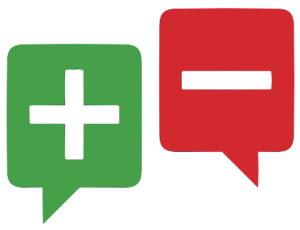Does journaling work?
People are storytellers by nature. –Duchin & Wiseman

Journaling is one of the simplest ways to transform our internal experience into a tangible narrative. Our lived experience – rich, unadulterated, and uniquely creative – supplies an endless wealth of material. The challenge is how to confront the discomfort and formulate these felt experiences into words.
In psychotherapy, there is the therapist, the patient, and a third space co-created by the patient and the therapist. This third space has been described as the “therapeutic alliance,” the “playground” (Freud), the “transitional space” (Winnicott), or the “intimate edge” (Ehrenberg). It is within this third space that one can take a step back, examine, and explore new ways of being. Journaling, in some ways, provides a similar space to “run wild.”[4] Instead of a therapist, the Current You is bearing witness to the Past You. It bridges the past and the present, from within to without. It allows one to process the loss of the life now passed and mourn a future that could have been.[1]
Benefits & Risks
Journaling (“experimental disclosure” or “expressive writing”) has been empirically demonstrated to improve physical and psychological health. Frattaroli’s meta-analysis of 146 studies found experimental disclosure to exert a significant – albeit small – effect in improving emotional distress (e.g., anger, anxiety), depressive symptoms, and positive functioning. Subsequent research has continued to validate the benefits of journaling for subjective wellbeing, diet, working memory, employment, and relationships.[3][8][11][12]
However, journaling may not be appropriate in all situations. Writing about aversive experiences naturally increases negative emotions in the immediate short-run. Since traumas can compromise the brain’s emotion regulatory system to calm itself down, journaling has the risk of leaving some individuals in a worse emotional state. People experiencing extremely stressful psychosocial situations (e.g., finances, homelessness) may also not benefit as much from journaling. In these cases, having a therapist can be helpful as a guide.[7][8]
In addition, writing about certain topics might not confer the same benefits. Widowers writing about their losses did not experience significant psychological or physical relief.[18] People who focused on negative body image felt worse.[5] Writing about positive things can actually reduce the euphoria of that experience.[15]
Proposed Theories

The Inhibition Theory emphasizes the value of catharsis, or venting. Repressing, suppressing, or avoiding uncomfortable emotions can lead to various mental illnesses. As such, journaling may serve as a form of exposure to confront these thoughts and feelings, producing relief via habituation. Notably, disclosure in and of itself does not decrease distress, and thus it is not simply enough to vent to feel better.[8]
 Psychological growth comes from understanding the causes and gaining insight from the experience. The Cognitive Processing Theory posits that psychological suffering derives from maladaptive thoughts about oneself and the world. Human beings are notoriously terrible at “thinking through things,” which can lead to brooding rumination. Journaling helps decrease rumination and obtain greater clarity.[13][17]
Psychological growth comes from understanding the causes and gaining insight from the experience. The Cognitive Processing Theory posits that psychological suffering derives from maladaptive thoughts about oneself and the world. Human beings are notoriously terrible at “thinking through things,” which can lead to brooding rumination. Journaling helps decrease rumination and obtain greater clarity.[13][17]
 Instead of writing solely about the negative aspects of events, there is also value in focusing on the positives. The Self-Regulation Theory adopts a strength-based approach of exploring the individual’s ability to overcome challenges, increasing self-efficacy, and finding meaning from the experience.[8][10]
Instead of writing solely about the negative aspects of events, there is also value in focusing on the positives. The Self-Regulation Theory adopts a strength-based approach of exploring the individual’s ability to overcome challenges, increasing self-efficacy, and finding meaning from the experience.[8][10]
 The Social Integration Model has received relatively less empirical support but may play an increasingly relevant role in the modern era of social media. Compared to those who only typed privately, adolescents who blogged publicly about their social-emotional difficulties experienced higher self-esteem, social activities, and functioning. This may represent a cultural shift regarding privacy and social interactions. Since adolescence marks a pivotal period of developing one’s social identity, blogging may be an apt platform for this age group. [3][16]
The Social Integration Model has received relatively less empirical support but may play an increasingly relevant role in the modern era of social media. Compared to those who only typed privately, adolescents who blogged publicly about their social-emotional difficulties experienced higher self-esteem, social activities, and functioning. This may represent a cultural shift regarding privacy and social interactions. Since adolescence marks a pivotal period of developing one’s social identity, blogging may be an apt platform for this age group. [3][16]
Cultural Distinctions
Journaling has been found to be effective for different age groups, gender, LGBTQ youths, veterans, and illnesses.[4][7][8][10][16] Some cultural differences have been noted in a few select samples. Preliminary research suggests Asian Americans find relief by focusing on persistence through failures whereas European Americans improve after comparing their situation to be more favorable than others’. Perhaps this downward social comparison helps remind a person of their positive attributes, which aligns with the more individualistic mentality.[19] Additionally, results have been mixed regarding the utility of focusing on emotions in cultural groups where emotional constraints may be more valued.[14] Further studies are needed to generalize these findings to a wider population.
General Tips on Effective Journaling
- Choose to write about negative experiences rather than positive ones.
- Include both facts and emotions.
- Allot at least 15 minutes to write in order to allow enough time for the emotions to emerge and subside.
- Try to answer these questions while you’re writing:[10]
- How have you tried to understand and make sense of the experience(s)?
- How does the experience affect your feelings about yourself, your self-worth, and your self-esteem?
- How does the experience affect your ability to solve problems, to meet future challenges, or to deal with day-to-day stress?
- How have you tried to understand the experience and make sense of it?
References
- Baker, S. (2009). Tell it slant: History, memory, and imagination in the healing writing workshop. Traumatology, 15(4), 15–23. https://doi.org/10.1177/1534765609348912
- Barclay, L. J., & Skarlicki, D. P. (2009). Healing the wounds of organizational injustice: Examining the benefits of expressive writing. Journal of Applied Psychology, 94(2), 511–523. https://doi.org/10.1037/a0013451
- Boniel-Nissim, M., & Barak, A. (2013). The therapeutic value of adolescents’ blogging about social–emotional difficulties. Psychological Services, 10(3), 333–341. https://doi.org/10.1037/a0026664
- Duchin, A., & Wiseman, H. (2019). Memoirs of child survivors of the Holocaust: Processing and healing of trauma through writing. Qualitative Psychology, 6(3), 280–296. https://doi.org/10.1037/qup0000128
- Earnhardt, J. L., Martz, D. M., Ballard, M. E., & Curtin, L. (2002). A writing intervention for negative body image: Pennebaker fails to surpass the placebo. Journal of College Student Psychotherapy, 17, 19–35. https://doi.org/10.1300/J035v17n01_04
- Ehrenberg, D. (1992). The Intimate Edge. N.Y., W.W. Norton and Co.
- Frankfurt, S., Frazier, P., Litz, B. T., Schnurr, P. P., Orazem, R. J., Gravely, A., & Sayer, N. (2019). Online expressive writing intervention for reintegration difficulties among veterans: Who is most likely to benefit? Psychological Trauma: Theory, Research, Practice, and Policy, 11(8), 861–868. https://doi.org/10.1037/tra0000462
- Frattaroli, J. (2006). Experimental Disclosure and its moderators: A meta-analysis. Psychological Bulletin, 132(6), 823-65.
- Freud, S. (1995). The Freud Reader. Edited by Peter Gay. New York: W. W. Norton & Company.
- Ironson, G., O’Cleirigh, C., Leserman, J., Stuetzle, R., Fordiani, J., Fletcher, M., & Schneiderman, N. (2013). Gender-specific effects of an augmented written emotional disclosure intervention on posttraumatic, depressive, and HIV-disease-related outcomes: A randomized, controlled trial. Journal of Consulting and Clinical Psychology, 81(2), 284–298. https://doi.org/10.1037/a0030814
- Klein, K., & Boals, A. (2001). Expressive writing can increase working memory capacity. Journal of Experimental Psychology: General, 130(3), 520–533. https://doi.org/10.1037/0096-3445.130.3.520
- Knapp, S., Gottlieb, M. C., & Handelsman, M. M. (2017). Enhancing professionalism through self-reflection. Professional Psychology: Research and Practice, 48(3), 167–174. https://doi.org/10.1037/pro0000135
- Lepore, S. J. (1997). Expressive writing moderates the relation between intrusive thoughts and depressive symptoms. Journal of Personality and Social Psychology, 73(5), 1030–1037. https://doi.org/10.1037/0022-3514.73.5.1030
- Lu, Q., Wong, C. C. Y., Gallagher, M. W., Tou, R. Y. W., Young, L., & Loh, A. (2017). Expressive writing among Chinese American breast cancer survivors: A randomized controlled trial. Health Psychology, 36(4), 370–379. https://doi.org/10.1037/hea0000449
- Lyubomirsky, S., Sousa, L., & Dickerhoof, R. (2006). The costs and benefits of writing, talking, and thinking about life’s triumphs and defeats. Journal of Personality and Social Psychology, 90(4), 692–708. https://doi.org/10.1037/0022-3514.90.4.692
- Pachankis, J. E., Williams, S. L., Behari, K., Job, S., McConocha, E. M., & Chaudoir, S. R. (2020). Brief online interventions for LGBTQ young adult mental and behavioral health: A randomized controlled trial in a high-stigma, low-resource context. Journal of Consulting and Clinical Psychology, 88(5), 429–444. https://doi.org/10.1037/ccp0000497
- Sloan, D. M., Marx, B. P., Epstein, E. M., & Dobbs, J. L. (2008). Expressive writing buffers against maladaptive rumination. Emotion, 8(2), 302–306. https://doi.org/10.1037/1528-3542.8.2.302
- Stroebe, M., Stroebe, W., Schut, H., Zech, E., & van den Bout, J. (2002). Does disclosure of emotions facilitate recovery from bereavement? Evidence from two prospective studies. Journal of Consulting and Clinical Psychology, 70, 169–178. https://doi.org/10.1037/0022-006X.70.1.169
- Tsai, W., Lau, A. S., Niles, A. N., Coello, J., Lieberman, M. D., Ko, A. C., Hur, C., & Stanton, A. L. (2015). Ethnicity moderates the outcomes of self-enhancement and self-improvement themes in expressive writing. Cultural Diversity and Ethnic Minority Psychology, 21(4), 584–592. https://doi.org/10.1037/cdp0000012
- Winnicott, D. (1953). Transitional objects and transitional phenomena. International Journal of Psycho-Analysis, 34, 89-97.
Credits
- Cognition by Dairy Free Design from the Noun Project
Conversation Opposites by Wolf Böse from the Noun Project
Speech Bubbles by DANT from the Noun Project
Suppress by Mun May Tee the Noun Project